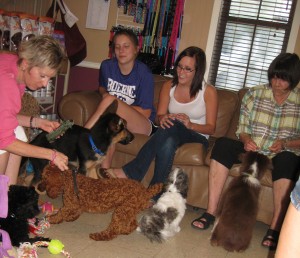A puppy is like a new canvas. They are not blank slates due to genetic and environmental factors, but they still will need our help with navigating their world. Everything about them is new, which leaves them extremely impressionable to their experiences within the next several weeks. You may be asking, “When is it ok to safely socialize my puppy? What are the risks? How can I minimize them?” We commend those of you who have asked us these questions because it shows that you are aware of viral diseases and that you care about your new dog. However, we want to ease your fears and concerns by presenting the facts.
The Critical Period
According to Purdue University’s Animal Behavior Clinic, “Puppies go through well-defined developmental stages. Puppy classes are designed to utilize the sociability of young puppies. However, the socialization period of dogs ends at around 12-14 weeks of age. Up to that age, puppies can readily learn not to fear new things, and to develop appropriate social behavior. If this opportunity to shape puppy behavior is missed, the puppies are likely to show behavior disturbances later in life. Therefore, in order to maximize the benefits of puppy classes, puppies should be enrolled at 7-10 weeks of age if possible, the sooner the better.”
Why Socialize?
Behavioral problems are one of the most common reasons that dogs are surrendered to a pound or shelter and it really doesn’t have to be that way with the right training and upbringing. Early socialization is one of the most important things you can do for your puppy to ensure that he grows up to be a confident, well-adjusted adult. It is much easier to prevent behavioral problems with early socialization and training than it is to go back and try to fix them later.
How to Socialize?
Set your puppy up for success! Puppy classes, with a qualified instructor, are worth their weight in gold. Not only is this a way to safely socialize in a controlled environment, but it also informs the new puppy owners how to continue training after the class. You can also host several gatherings at your home with all types of people, especially men and children. Can we say puppy parties? Talk about cuteness overload! Have each guest hand feed treats to your puppy.
Take your dog to human parks, dog-friendly stores, the vet clinic (for fun visits with lots of treats from the vet and staff), and if possible, other homes that are good environments for your puppy. We do not suggest dog parks as a means to socialize your puppy because of the unpredictable environment, both disease wise and dog wise. You never know what the incoming dog’s temperament will be like and this is not the time to hope for the best. One bad experience for a puppy can leave a permanent impression in this young, little brain and the dog park is just not worth that risk.
Minimizing Risk
Unfortunately, there are still some veterinarians as well as some breeders and maybe even a few dog trainers who advise against early socialization for your puppy. The main objection is the need to protect young puppies from disease. Puppies less than 3-4 months old are more easily socialized but they are also more susceptible to diseases such as parvovirus and distemper.
Fortunately, we can minimize that risk by choosing our puppies playmates carefully. We can choose other puppies and adult dogs that we know are healthy and up-to-date on routine veterinary health care such as vaccinations and wormings. We can avoid dog parks and other areas where we cannot control which animals our puppies will encounter.
Health Guidelines:
Purdue University’s Animal Behavior Clinic states, “The puppy classes at Purdue University’s Animal Behavior Clinic start any time between 7 and 14 weeks of age and at least 10 days after initial vaccination for the Distemper/Parvo combination and Bordatella.” The American Veterinary Society of Animal Behavior believes that it should be the standard of care for puppies to receive such socialization before they are fully vaccinated because the benefits outweigh the risks. We agree with the standards set forth by the American Veterinary Society of Animal Behavior.
We want you to enjoy your new bundle of fur and that delightful puppy breath, but we also want to help you shape a well adjusted canine, safely. Socialization and training should be top priorities before, during, and after you bring your puppy home. We’ll be the first to admit that a new collar, dog bed, toys and everything else that screams, “puppy!” are all fun to buy, but nothing leaves more of a stamp on your dog’s life (and your relationship with that dog), than proper socialization.
As always, please contact us if you have questions! For those that live in Austin and the surrounding areas our dog and puppy class schedule can be seen here.
Post by: Laura Neiheisel and Lorie Huston, DVM
List of Credible Content for Further Reading:
For the full letter by Purdue University, you can go here.
The American Veterinary Society of Animal Behavior endorses early socialization for puppies and provides further tips on socializing your puppy correctly. Go here to learn more.
Dr Dunbar’s, Dog Star Daily, Continued Socialization article, go here.
For puppy classes in Austin, you may contact us: laura@austindogzone.com


[…] Socialize young puppies around children as soon as possible. […]